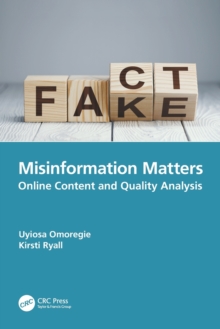Description
| Product ID: | 9781032311562 |
| Product Form: | Paperback / softback |
| Country of Manufacture: | GB |
| Title: | Misinformation Matters |
| Subtitle: | Online Content and Quality Analysis |
| Authors: | Author: Kirsti Ryall, Uyiosa Omoregie |
| Page Count: | 100 |
| Subjects: | Media studies, Media studies, Psychological theory, systems, schools and viewpoints, Social, group or collective psychology, Organizational theory and behaviour, Engineering: general, Ergonomics, Environmental science, engineering and technology, Digital and information technologies: social and ethical aspects, Digital and information technologies: Legal aspects, Internet guides and online services, Computer networking and communications, Human–computer interaction, Psychological theory & schools of thought, Social, group or collective psychology, Organizational theory & behaviour, Engineering: general, Ergonomics, Environmental science, engineering & technology, Ethical & social aspects of IT, Legal aspects of IT, Internet guides & online services, Computer networking & communications, Human-computer interaction |
| Description: | Select Guide Rating This book answers questions such as What is ‘misinformation’? Why does it matter? How does it spread on the internet? How can we counteract its worst effects? The text ends with an author-designed, practical, easy-to-use model allowing users to effectively analyse the quality of trending content. What is "misinformation"? Why does it matter? How does it spread on the internet, especially on social media platforms? What can we do to counteract the worst of its effects? Can we counteract its effects now that it is ubiquitous? These are the questions we answer in this book. We are living in an information age (specifically an "algorithmic age") which prioritizes information "quantity" over "quality". Social media has brought billions of people from across the world together online and the impact of diverse platforms, such as Facebook, WeChat, Reddit, LinkedIn, Signal, WhatsApp, Gab, Instagram, Telegram, and Snapchat, has been transformational. The internet was created, with the best of intentions, as an online space where written content could be created, consumed and diffused without any real intermediary. This empowering aspect of the web is still, mostly, a force for good. People, on the whole, are better informed and online discussion is more inclusive because barriers to participation are reduced. As activity online has grown, however, an expanding catalogue of research reveals a darker side to social media, and the internet generally. Namely, misinformation’s ability to negatively influence our behaviour both online and offline. The solution we provide to this growing dilemma is informed by Ludwig Wittgenstein’s Tractatus Logico-Philosophicus, which examines the relationship between language and reality from a philosophical perspective, and complements Claude Shannon’s Information Quantity Theory, which addresses the quantification, storage and communication of digital information from a mathematical perspective. The book ends by setting out a model designed by us: a "Wittgensteinian" approach to information quality. It defines content published online by clarifying the propositions and claims made within it. Our model’s online information quality check allows users to effectively analyse the quality of trending online content. This approach to misinformation analysis and prevention has been designed to be both easy to use and pragmatic. It upholds freedom of speech online while using the "harm principle" to categorise problematic content. |
| Imprint Name: | CRC Press |
| Publisher Name: | Taylor & Francis Ltd |
| Country of Publication: | GB |
| Publishing Date: | 2023-04-19 |
